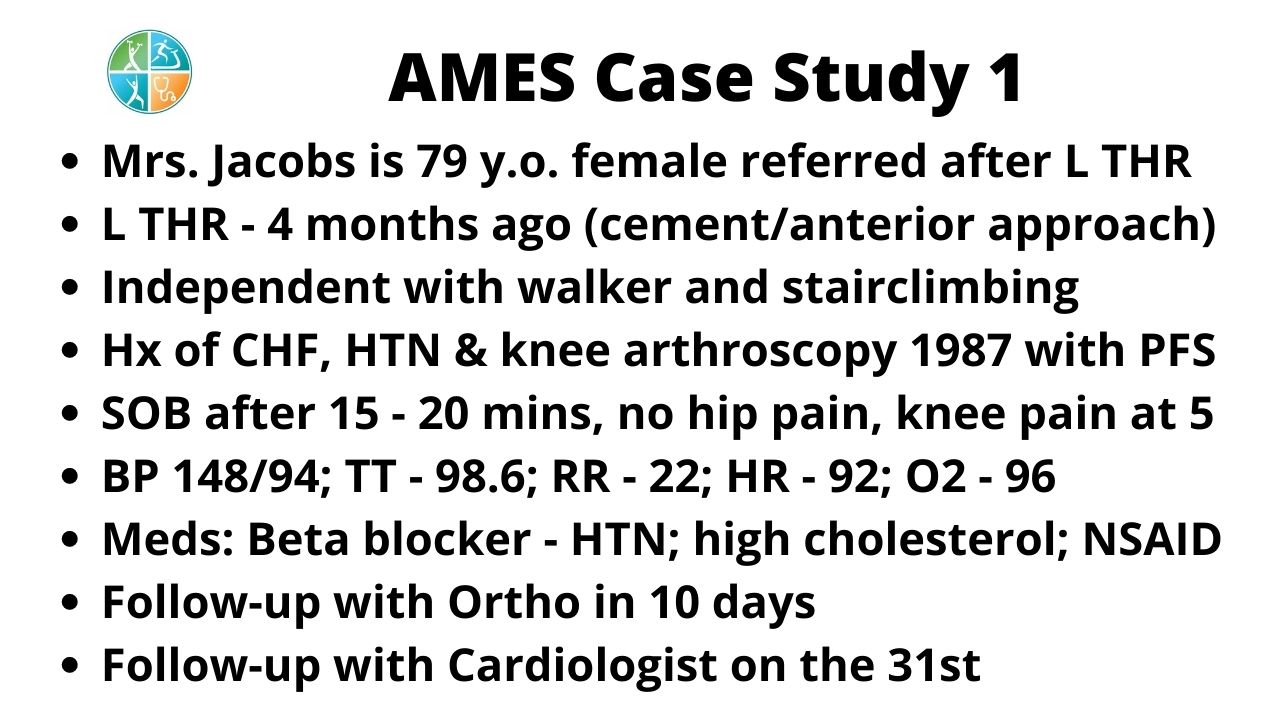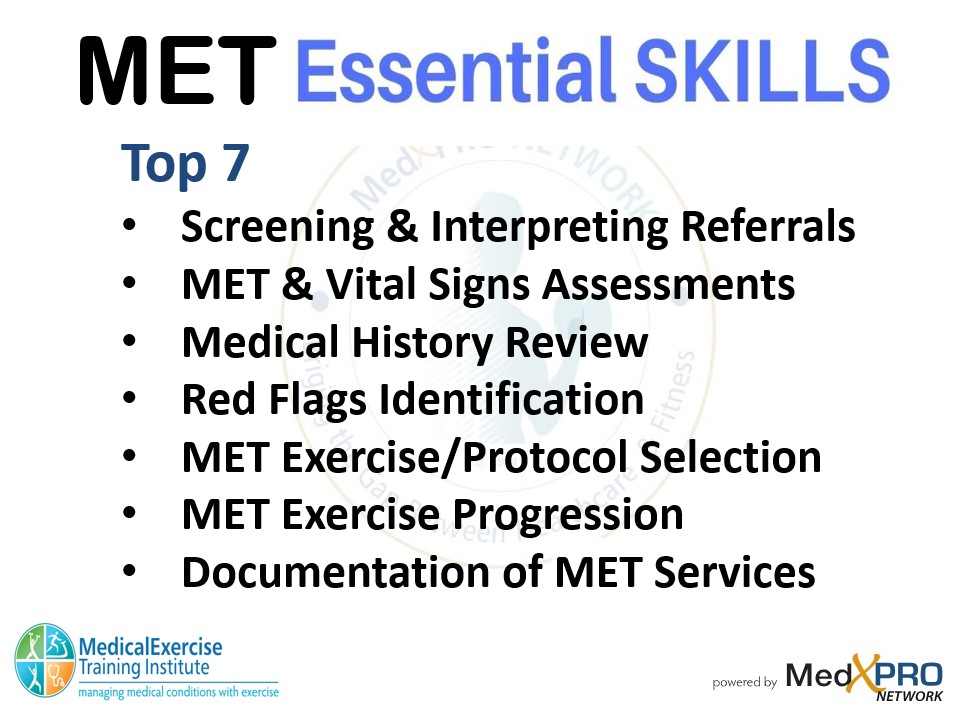Medical Exercise vs Physical Therapy, Corrective Exercise & Medical Fitness...Understand the Subtle Differences.
Subscribe HERE for the Podcast.
Medical Exercise vs. Physical Therapy
Medical Exercise is the use of exercise to help individuals manage medical conditions after they have completed physical therapy or other rehabilitation programs. The physical therapist treats the patient’s functional limitations resulting from a disease, injury, or surgery. They use various treatment modalities, including manual therapy, electrical stimulation, and ultrasound in treating the patient.
The Medical Exercise Specialist (MES) does not diagnose or treat the individual. The MES uses strength, flexibility, and cardiovascular exercise to help the client address functional deficits that remain after the client has completed rehabilitation. The goal of Medical Exercise is to achieve positive functional outcomes while helping the client improve their long-term health, function, and wellbeing.
Medical Exercise vs. Personal Training
Personal Training provides clients with supervised exercise instruction t...
MET Assessment of the Shoulder
The MET Assessment Skills Series begins August 21st @ 10am with the shoulder. This session will go deep into the assessment of the shoulder. We will review goniometric testing, manual muscle testing, and some special testing procedures at the shoulder. Each participant will receive a personalized MET shoulder assessment form as well as the shoulder assessment/exercise grid. Go to www.METAssessmentSeries.com to register.
Medical Exercise Specialist - What is Your Most Important Skill?
Hey Medical Exercise Specialist! What is the most important skill you possess as a medical exercise profession? Is it your ability to come up with creative exercise programming? Is it your understanding of dozens of different methods to strengthen the bicep, the quadricep, or the hamstring? Is it your ability to use the foam roller? Is it your understanding of anatomy? Or is it your ability to perform a thorough and effective assessment of the medical exercise training client? Which one is it?
I've taught the Medical Exercise Specialists (MES) around the world since our first MES workshop in July 1994. This is our 28th year and we are seeing a change in the medical exercise training client. This is due to the reduction in physical therapy, occupational therapy, and chiropractic services. With clients receiving less rehab services, they now arrive at your medical exercise doorstep in need of more specific and challenging exercise management for their medical condition.
The MET c...
Personal Trainer vs Medical Exercise Specialist....which are you?
Let's continue outlining our Advanced Medical Exercise Specialist Virtual Workshop. We will use case studies to teach and apply the advanced MET skills and techniques taught in this course. We will start with Mrs. Jacobs' case study:

The AMES will give you the ability to identify and use:
- Red Flags
- Vital Signs
- Functional Outcome Measures
- Muscle Testing
- Goniometry
- Balance and Gait
These components are used to determine if the client is appropriate for exercise (should be referred back to physical or occupational therapy or a physician) as well as the basis for a safe and effective MET program. These MET skills are just a few of the more than 52 reviewed in the AMES Virtual workshop. These skills will help you make the transition from personal trainer to Medical Exercise Specialist. Go to www.AMESVirtualWorkshop.com to register. Register now.....only a couple seats are left!
Medical Exercise Specialist - Medical History or PAR-Q??
Hello again Medical Exercise Specialists. Don't forget about our Advanced Medical Exercise Specialist Virtual Workshop coming up July 28 - 31, 2022. Learn advanced medical exercise training concepts from the comfort of your home or studio. This 4-day workshop is the most detailed and comprehensive workshop available for medical exercise/fitness professionals. We will use MET client case studies to present and apply the information in this workshop.
Our AMES first case study looks at Mrs. Jacobs. A client referred following a left total hip replacement along with congestive heart failure, hypertension and patello-femoral syndrome. The first workshop session will review how to take a thorough medical history as a MES. Here's our first case study:

We will teach you how to take a detailed medical history rather than using the PAR-Q. Working with MET clients required a more detailed medical history than those seeking personal training. The medical history is the first step in MAN...
Don't Forget...The Advanced Medical Exercise Specialist is Virtual
7 Top Medical Exercise Training Skills
Medical Exercise Specialists, numerous times I have mentioned establishing competence and confidence in MET skills. Through conversations with MET instructors and experienced MESs we have identified the 7 most important skills every MedXPRO must demonstrate skill. Listen as Dr Mike outlines these 7 top skills.
The 7 Top MET Skills are:

Please grade your MET skills by completing the MedXPRO Skills Checklist:
METSkillsChecklist.com
AMES VIRTUAL Workshop is Coming!
The Advanced Medical Exercise Specialist Workshop - July 28 - 31, 2022 is SOLDOUT!! Register now for the VIRTUAL Advanced Medical Exercise Specialist Workshop!! This is the most comprehensive workshop for medical exercise/fitness professionals available anywhere. It’s ONLY $500!!
What you'll get:
- Attendance at 4-day Virtual AMES Workshop
- AMES Virtual Workshop Manual
- AMES Workshop Recordings
- AMES Professional Resources
- 1-year MedXPRO Network Membership
This version of the AMES workshop is totally virtual. Attend from the comfort of your home or studio. We will broadcast the virtual AMES via Zoom. Recordings will upload within 24 hours to a private AMES workshop members site. You will receive an email with all the info to access this site.
Click HERE to register!!
Medical Exercise Skills Are Key to Credibility
Competence and confidence in medical exercise training skills is a must for all medical exercise professionals (MedXPROs). The Medical Exercise Training Institute (METI) has identified the 52 essential medical exercise training skills. The 52 skills areas are noted below. Every MedXPRO should have competence in each of these areas. Please assess your skills by completing the MedXPRO Skills Checklist. Click the link below to get started: www.MedicalExerciseSkills.com.

Medical Exercise Training Institute - May 2022 Update
Hello and welcome to the Medical Exercise Training Institute's May 2022 update. We've been busy that last few months with: 1) development of the Medical Exercise Professional Ethics training; and 2) the development and redeployment of the MedXPRO Network. We have also published 30 MET Ethics and we continue to offer Advanced Medical Exercise Specialist workshop in July 2022 here in Houston.
Medical Exercise Professional Ethics course
Advanced Medical Exercise Specialist Workshop - July 28 - 31, 2022
Medical Exercise Certification Renewal
